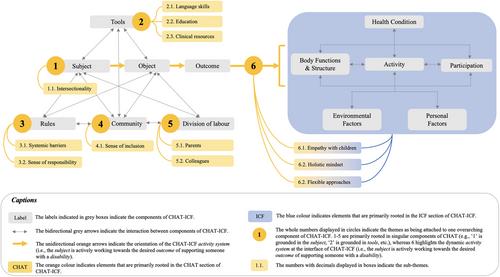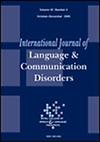`It's not just linguistically, there's much more going on’: The experiences and practices of bilingual paediatric speech and language therapists in the UK
Abstract
Background
Despite the high prevalence of bilingualism in the United Kingdom, few speech and language therapists (SLTs) are bilingual themselves. Most SLT research on bilingualism has generated knowledge to inform service delivery for bilingual clients, but few studies have investigated how being a bilingual SLT influences one's professional experiences and practices. Better understanding the unique positionality of bilingual SLTs can yield critical insights to meaningfully address issues of diversity, inclusion and equity in the profession.
Aims
To investigate the experiences and practices of bilingual paediatric SLTs in the United Kingdom through the lens of Cultural-Historical Activity Theory-International Classification of Functioning, Disability and Health (CHAT-ICF), a new theoretical framework developed to conceptualise the activities of professionals working in the field of disability.
Methods
In this qualitative study, 19 bilingual paediatric SLTs practising in the United Kingdom were interviewed individually. Participants were recruited through a snowball sampling strategy, and semi-structured interviews conducted online. The data were analysed using reflexive thematic analysis and following a hybrid inductive-deductive approach to map the results onto the CHAT-ICF framework.
Results
Six overarching components of the CHAT-ICF framework hosted the 12 sub-themes identified to capture the experiences and practices of bilingual SLTs: (1) Subject (intersectionality); (2) Tools (language skills, education, clinical resources); (3) Rules (systemic barriers, sense of responsibility); (4) Community (sense of inclusion); (5) Division of labour (parents, colleagues); and (6) Practice (empathy with children, holistic mindset, flexible approaches). The use of the CHAT-ICF theoretical lens revealed two fundamental structural phenomena: (1) the distribution of sub-themes across many components of CHAT-ICF demonstrated that being a bilingual SLT is a multifactorial experience; and (2) the chain reactions between sub-themes illustrated the dynamic nature of bilingual SLTs’ experiences which can be harnessed to challenge marginalisation and promote equity in the profession.
Conclusion & Implications
This is the first qualitative study to date to provide in-depth insights into the experiences and practices of bilingual SLTs in the United Kingdom. These insights can be mobilised to inform the meaningful inclusion of bilingual SLTs in workforce planning efforts and service development. Recommendations include using intersectional lenses, providing cultural and anti-racism awareness training to SLTs, developing more diverse clinical resources and flexible approaches for bilingual families, valuing bilingualism in recruitment processes and increasing accountability at the leadership level. Research giving voice to bilingual SLTs, and other underrepresented demographics in the SLT workforce, can catalyse action to promote a more diverse and inclusive profession in line with the Royal College of Speech and Language Therapists' strategic vision 2022–2027.
WHAT THIS PAPER ADDS
What is already known on the subject
- Most research on bilingualism in speech and language therapy is focused on issues related to service provision and delivery for bilingual clients with little consideration for bilingual speech and language therapists’ (SLTs) unique positionality. A few survey studies have shown that bilingual SLTs report significantly higher competency and greater confidence when working with clients who speak multiple languages, but there are significant gaps in understanding how bilingualism impacts other aspects of their professional experiences.
What this paper adds to existing knowledge
- This is the first study to provide in-depth insights into the experiences and practices of bilingual SLTs in the United Kingdom. We show that being bilingual profoundly impacts many aspects of their professional experiences, including their clinical identity, skillset, sense of inclusion in the workplace, work relationships and clinical approaches. Bilingual SLTs expressed developing trust relationships with bilingual families and adopting flexible approaches to account for their clients’ environmental factors, all of which can contribute to more equitable SLT services. This study also makes a novel contribution by proposing and using the Cultural-Historical Activity Theory-International Classification of Functioning, Disability and Health (CHAT-ICF) framework to conceptualise and investigate SLTs’ experiences and practices.
What are the potential or actual clinical implications of this work?
- This study provides evidence-based recommendations to inform progress towards the Royal College of Speech and Language Therapists' strategic vision 2022–2027 and the diversification of the profession. Actions to support bilingual SLTs and diversify the profession include shifting a rigid mindset of linguistic and cultural `competence’ to self-growth and awareness, developing more diverse clinical resources and flexible approaches for bilingual families, valuing bilingualism in SLT recruitment processes and career progression and increasing accountability and leadership around issues of diversity in the workplace. The novel CHAT-ICF framework has the potential to be used to support therapists’ reflexivity in their practice or structure audits of rehabilitation services. Intersectionality theories and transformative processes can catalyse positive change in clinical services and research around bilingualism.


 求助内容:
求助内容: 应助结果提醒方式:
应助结果提醒方式:


